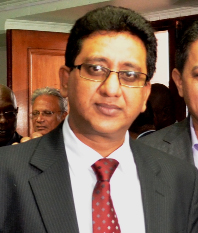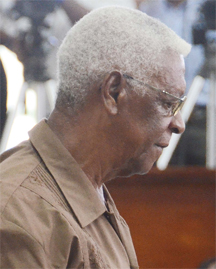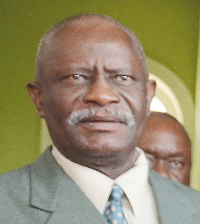A motion calling for the removal of barricades around the Public Buildings, in order to allow members of the public to assemble in closer proximity of the National Assembly, was approved early last Friday morning.
Although there was concern by government members about the safety of Members of Parliament (MPs), APNU and AFC used their combined one-seat majority to carry the motion, which also called for Parliament Office to make arrangements for the broadcast of National Assembly sittings in the immediate environment—beginning with the installation of speaker boxes.

The motion, which was moved by APNU MP Desmond Trotman, sought to have the National Assembly to declare that the rights of citizens to assemble and demonstrate peacefully should not be hindered by the Guyana Police Force or any other agency or institution of state, and for the police force to relocate its barriers to allow freedom of assembly within closer proximity of the Public Buildings.
Trotman, who led the debate on the motion in the early hours of last Friday morning, bluntly stated that the barricades must go, thereby sending a strong signal that one’s freedom is a cornerstone of democracy.
But Attorney General and PPP/C MP Anil Nandlall, said that although the fundamental right of a person to assemble is guaranteed by the constitution, like every other right, there is a restriction imposed and for an important reason.
Nandlall noted that for maintenance of public order, persons can be restricted to assemble by erection of barricades, for which the police force has the final say. As a result, he stated that the National Assembly must be careful with how it interferes with statutory issues, noting that the police force has made a decision utilising its technical judgment and discretion.
Further, Nandlall also said that he was concerned about the injuries which can be sustained by persons beyond the barriers as well as those within the National Assembly. He recounted an incident in 1997, in which late former President Janet Jagan’s car was stoned when the then Head of state went to address the Seventh Parliament. “The environment out there is not in state that people think is safe,” he declared, while noting that the Parliamentary Management Committee is addressing the issue of security within the precincts of the Public Buildings and it is high on the agenda. “The bottom-line is that those things [the barricades] are out there largely for the safety of parliamentarians. I agree that the balance must be struck,” he added, noting that there are complaints by persons of the barriers being set up at 9 am. However, he said that one must also consider the “other extreme” of the security of the National Assembly being breached.

But APNU MP and former Police Commissioner Winston Felix noted that the public had always enjoyed freedom to assemble outside of the Public Buildings, and it was a freedom that he enjoyed as a young man. However, he explained that in 2004, it became expedient for the police to protect the National Assembly against attacks by bandits “who were doing anything, anytime, [and] anywhere,” leading to the erection of the barriers for the protection of Parliament.
Felix noted that the Police Act gives the police the right to set up barriers and also to remove them at their discretion. “The barriers serve no purpose now, the armed criminals who were around have all gone… our position is that the erection of barriers to protect citizens need to be driven by intelligence,” he added. “Whatever happens around parliament has to be the result of a breakdown of intelligence.”
AFC MP Moses Nagamootoo endorsed the motion, noting that Trotman has made the case that the barrier must be brought down and that persons must have the right to assemble, picket and demonstrate outside of the Public Buildings.
Home Affairs Minister Clement Rohee was met with continued shouts of “no, no, no, Rohee, no,” when he rose to speak, prompting an intervention from Speaker Raphael Trotman, who said that if the minister was unable to speak and be heard, then the motion would not be passed.
He said that the opposition had to option to exit the chamber and allow the minister to continue with his presentation. MP Gail Teixeira rose and supported the Home Affairs Minister, stating that as an MP, he has a right to make his presentation regardless of any circumstance. (The opposition recent passed a motion of no confidence against Rohee and main opposition APNU had announced a public policy of non-cooperation with him.)

Rohee, in his presentation, said that the police force at all times has to exercise judgment where the rights of persons assembling in the vicinity of the Public Buildings are concerned. “We cannot have it both ways; where on the one hand we make to direct the police in their operations what to do and what it should not do and in the other formulate a policy that conflicts with what resides solely within the bosom of the police force,” he said.
Citing new forms of crimes which are emerging, he said that every citizen has to be protected. “Those who are short-sighted into believing that in calling for the removal of the barriers because of the support outside of parliament, you might very well want to regret it,” he stated.
Meanwhile, Nandlall also spoke against the placement of speaker boxes to broadcast the deliberations of the Assembly, saying while it would have been an effective means of communication 40 years ago, the issue of noise pollution must now be considered, particularly in an area declared a silent zone, given the proximity of the courts. “Imagine you have loudspeakers with the melodious voice of the Honourable Member Ms Amna Ally swaying over the speakers,” he noted, while pointing to other mediums available, such as live streaming over the internet.





